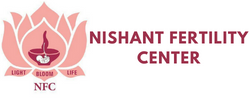Why IUI Fails: Common Reasons and Solutions
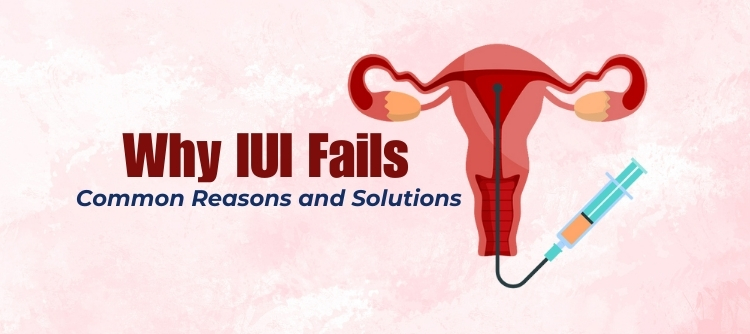
Intrauterine insemination (IUI) is a popular fertility treatment that has helped many couples achieve their dream of parenthood. However, like any medical procedure, IUI doesn’t always result in success. In this blog post, we’ll explore the ins and outs of IUI treatment, common reasons for failure, factors affecting success rates, and advanced techniques to improve outcomes.
What is IUI Treatment?
IUI treatment, or intrauterine insemination, is a fertility procedure where specially prepared sperm are directly inserted into a woman’s uterus during her fertile window. This method increases the chances of fertilization by placing a high concentration of healthy sperm closer to the egg.
Related – Understanding Intrauterine Insemination (IUI): A Comprehensive Guide
Reasons for IUI Failure
Despite its potential, IUI treatment doesn’t always result in pregnancy. Some common reasons for IUI failure include:
1. Poor sperm quality: Even after preparation, if sperm count, motility, or morphology is low, fertilization may not occur.
2. Timing issues: If the IUI is not performed during the optimal fertility window, the chances of success decrease significantly.
3. Blocked fallopian tubes: If the fallopian tubes are blocked or damaged, the sperm may not be able to reach the egg.
4. Advanced maternal age: As a woman ages, egg quality and quantity decline, reducing the chances of successful conception.
5. Underlying fertility issues: Conditions like endometriosis, polycystic ovary syndrome (PCOS), or hormonal imbalances can impact IUI success.
6. Lifestyle factors: Smoking, excessive alcohol consumption, poor diet, and high stress levels can negatively affect fertility.
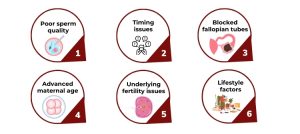
Factors Affecting IUI Success
Several factors can influence the success rate of IUI treatment:
1. Age of the female partner: Women under 35 generally have higher success rates with IUI.
2. Cause of infertility: Some types of infertility respond better to IUI than others.
3. Sperm parameters: Higher sperm count, motility, and normal morphology increase the chances of success.
4. Number of mature follicles: Having more than one mature follicle can improve the odds of conception.
5. Use of fertility medications: Combining IUI with ovarian stimulation can increase success rates in some cases.
6. Timing of the procedure: Accurate timing of the IUI in relation to ovulation is crucial.
7. Number of IUI cycles: Success rates may improve with multiple attempts, up to a certain point.
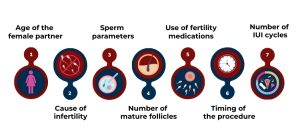
Advanced Techniques to Improve IUI Success
At Nishant IVF Care, we employ several advanced techniques to enhance the chances of IUI success:
1. Ovarian stimulation protocols: Tailored medication regimens to optimize follicle development and egg quality.
2. Advanced sperm preparation techniques: Methods like density gradient centrifugation to select the healthiest sperm.
3. Ultrasound monitoring: Regular ultrasounds to precisely time the IUI procedure.
4. Dual insemination: Performing two inseminations within a single cycle to increase the chances of fertilization.
5. Endometrial scratching: A technique that may improve embryo implantation in some cases.
6. Genetic testing: Preconception genetic screening to identify potential genetic issues.
7. Lifestyle optimization: Personalized advice on nutrition, stress management, and overall health to improve fertility.
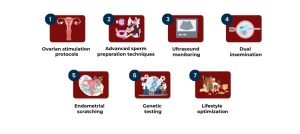
Conclusion
While IUI treatment can be an effective fertility solution, it’s important to understand that success is not guaranteed. By addressing potential reasons for failure and optimizing various factors, we at Nishant IVF Care strive to maximize the chances of a successful outcome for each patient.
If you’ve experienced unsuccessful IUI attempts or are considering this treatment, our team of fertility specialists is here to provide personalized care and advanced solutions. We understand that every fertility journey is unique, and we’re committed to helping you achieve your dream of parenthood.
Remember, persistence and a comprehensive approach are key in fertility treatments. If IUI doesn’t succeed, there are other options available, such as IVF, which may be more suitable for some couples. Always consult with your fertility specialist to determine the best path forward for your specific situation.
At Nishant IVF Care, we’re dedicated to providing state-of-the-art fertility treatments and compassionate care to support you every step of the way. Contact us today to learn more about how we can help you on your journey to parenthood.
